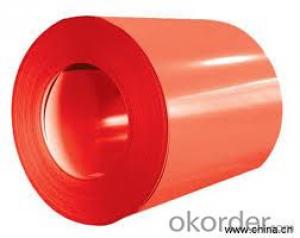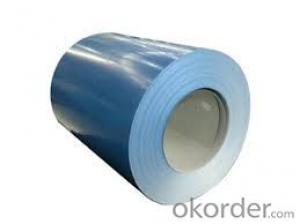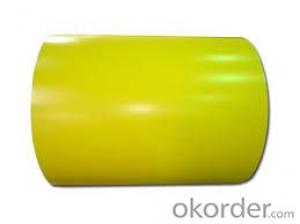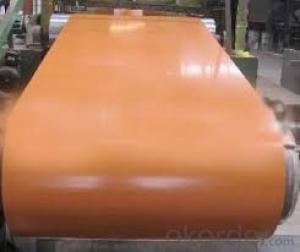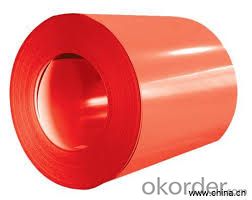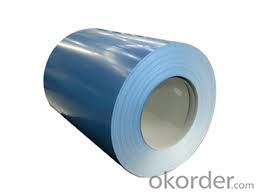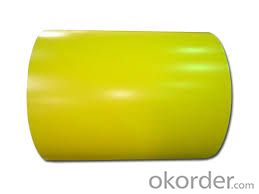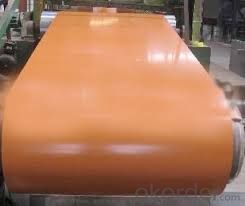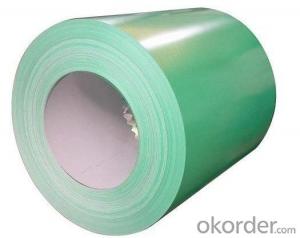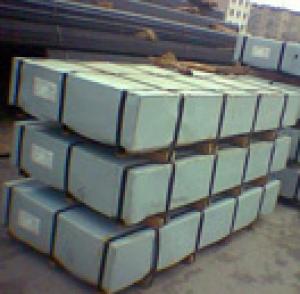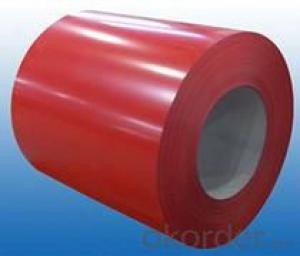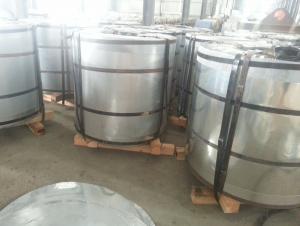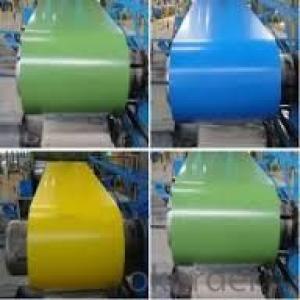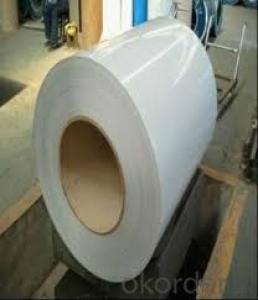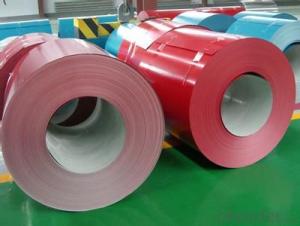Prepainted Galvanized Rolled Steel Coil Sheet
- Loading Port:
- Tianjin
- Payment Terms:
- TT OR LC
- Min Order Qty:
- 100 m.t.
- Supply Capability:
- 500000 m.t./month
OKorder Service Pledge
OKorder Financial Service
You Might Also Like
Brief Introduction
Prepainted Galvanized Steel usually refers to have substrateprocessed with surface processed and coated then(roller coated )or bonded organic thin film and baked, and it is able to be processed tofinal prodevtion .
PrepaintedGalvanized Steel qualified with excellent decorative ,formability ,corrosionresistance ,coating adhesion ,can keep for a long time as well as maintainfresh color .For color coated steel sheet can obtain good economicbenefit by steel belt wood ,efficient in construction and save energy ,preventpollution etc.Which is an ideal material;for manufacturing board.
Specifications OfPrepainted Galvanized Steel
Thickness 0.20-1.2mm (BMT) Width 600-1250mm |
Zinc Coating 100-275g/m2 |
Color According to RAL color fan or as per request |
Internal Diameter 508mm or 610mm |
Coil Weight 3-6MT |
Quality Commercial and structural quality |
Paint Polyester paint for topside, epoxy for reverse |
Standard JIS G 3312, ASTM A755M, EN 10169 |
Base Steel Grade SGCC,SGCD,DX51D+Z,DX52D+Z;S200GD,S220GD,S280GD,S350GD,CS,FS,SS |
Chemical Composition Of Prepainted Galvanized Steel
C | Si | Mn | P |
0.04-0.06% | 0.01-0.03% | 0.18-0.22% | 0.014-0.016% |
Technical Data Of Prepainted Galvanized Steel
Yield Strength | (Mpa) 280-320 |
Tensile Strength | (Mpa) 340-390 |
Elongation | 20%-30% |
Reverse Impact | 9J |
T-bending | ≥2T |
Pencil Hardness | ≥2H |
Duration Of Salt Spray Test | 500 H |
Bending At 180 Degree | No crack, purling and fraction |
Applications OfPrepainted Galvanized Steel
It can be widely used in transportation, light industry, civil usage and farming. It is also the perfect building material in construction for making steel roofing,insulation panel, corrugate sheet, facade wall,shutters,T-bar and home appliance.
Packaging & Delivery Of Prepainted Galvanized Steel
The packing of coils consists of anti-damp paper, PVC film, hardboard paper, steel box, strapped with steel strips, fitted with locks and edge protectors and guarantees the optimal condition of the delivered goods. Each coil can be additionally fitted with wooden/steel skids(eye to the side) or wooden pallets(eye to the sky)
Images of Prepainted Galvanized Steel:
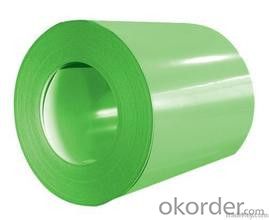
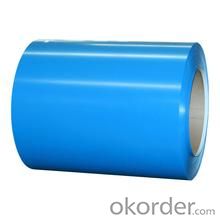
- Q: Why does steel with several composites have a greater hardenability from quenching than low carbon steel alloys?Any help would be great
- Bit tricky to explain and I don't know muh about it but steel on its own has lost of gaps in it ( the molecular structure) and when carbon is added thos gaps are filled, I think of it like this: it is easier to punch through expanded polystyrene( with all the little balls) than unexpanded(just a lump of plastic) as the balls are not properly joined and have air pockets between them.
- Q: I have heard using the BRASS casing is the best thing for an AR-15? Should i just use Brass or Steel?
- Many people have to jam a cleaning rod muzzle end first, using a hammer to bang out steel cased ammo out of an Ar rifle. This has happened to me 3 times and will Never happen again. It said its harder on the extractor, well that is not so but the case will be badly damaged by the extractor and I don't think that is a good thing for any extractor. Any individual pushing steel cased ammo must be selling it...Don't Buy It!!!
- Q: My remington has a 28 inch barrel and was wondering if it would damage my shotgun to shoot steel out of it?
- That barrel cost 150 dollars for a reason. They are god made to withstand these kind of shots.
- Q: Which one is stronger steel or metal ( for bow and arrows) please answer I need it for a book I'm writing
- Metal includes steel, as well as thousands of other metals and alloys. In other words, steel IS a metal. So your question is meaningless, sorry.
- Q: What is future prospect of these steel structures, are they really weather proof like everyone believes??
- Yes okorder /
- Q: What are the different types of steel coil slitting machines?
- There are several different types of steel coil slitting machines, including manual slitters, semi-automatic slitters, and fully automatic slitters. Manual slitters require manual adjustment and operation, while semi-automatic slitters have some automated features but still require some manual intervention. Fully automatic slitters are the most advanced type, with fully automated controls and high-speed operation.
- Q: Are steel coils used in shipbuilding?
- Yes, steel coils are commonly used in shipbuilding. They are primarily used to manufacture various structural components and hull sections of ships due to their strength, durability, and resistance to corrosion.
- Q: How are steel coils used in the manufacturing of transmission shafts?
- Steel coils are used in the manufacturing of transmission shafts as they provide the raw material required for shaping and forming the shaft. The steel coils are typically cut into specific lengths and then undergo various processes such as heat treatment, machining, and forging to shape them into transmission shafts, which are crucial components in the transmission system of vehicles and machinery.
- Q: How are steel coils used in the production of household appliances?
- Steel coils are used in the production of household appliances as they are a primary material for manufacturing various components like frames, panels, and cabinets. The coils are typically processed and formed into the desired shapes, providing strength, durability, and structural stability to appliances such as refrigerators, washers, dryers, and ovens.
- Q: How are steel coils used in the manufacturing of construction bulldozers?
- Steel coils are used in the manufacturing of construction bulldozers to create the main structural components, such as the chassis and the blade, which require the strength and durability that steel provides. The coils are processed and shaped into the desired parts through cutting, bending, and welding techniques, ensuring the bulldozers can withstand heavy loads and harsh working conditions on construction sites.
Send your message to us
Prepainted Galvanized Rolled Steel Coil Sheet
- Loading Port:
- Tianjin
- Payment Terms:
- TT OR LC
- Min Order Qty:
- 100 m.t.
- Supply Capability:
- 500000 m.t./month
OKorder Service Pledge
OKorder Financial Service
Similar products
Hot products
Hot Searches
Related keywords
